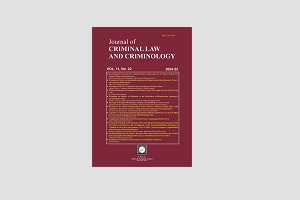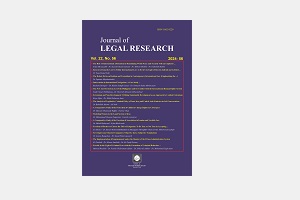Journal of
Criminal Law and Criminology
Number 13
Vol. VII ● No. 1
Spring – Summer 2019
Managing Editor: Vahid Eshtiagh
Editor-in-Chief: Mohammad Ashoori
CONTENTS
Articles
The European Union and International Criminal Court: Institutional Cooperation and Support
Dr. Seyyed Ghasem Zamani & Dr. Esmaeel Yaghoubi
The Scope of Penal Mediation in Various Types of Crimes in Iranian Substantive Law
Dr. Hossein Gholami & Dr. Badr Soudani Sadery
Punishment Mitigation in the Law of Campaign against Trafficking Goods and Currency Passed in 1392
Ahmad Reza Koocheki & Dr. Shahram Ebrahimi
A Criminological Study of the Effective International Factors on Committing Crimes against Humanity
Dr. Samira Golkhandan
The Consequences of Populist Penal Policy in Sexual Crimes against Children and Teenagers
Dr. Parima Taherishad & Dr. Hooshang Shambayati
An Introduction to “Criminal Insurance Law” towards an “Insurance-Oriented Criminal Policy”
Dr. Mehrdad Rayejian Asli & Naeim Saha’mi
Conflict or Interaction of Foreign Criminal Laws with Victim’s Rights; in Light of the Principle of Mutual Recognition in EU Criminal Law
Dr. Javad Salehi
Principle of Mutual Recognition of Judgements and Judicial Decisions in European Union Criminal Law with Look at Criminal Judgements and European Arrest Warrant
Dr. Behzad Razavi Fard & Mohammad Faraji
Articles
The European Union and International Criminal Court: Institutional Cooperation and Support
Dr. Seyyed Ghasem Zamani
Professor at International and Public Law Department, Faculty of Law and Political Sciences, Allameh Tabataba’i University, Tehran, Iran
&
Dr. Esmaeel Yaghoubi
Ph.D. Graduate at International Law, Faculty of Law and Political Sciences, Allameh Tabataba’i University, Tehran, Iran
:Abstract
Establishment of International Criminal Court (ICC) can undoubtedly be considered as the most significant achievement of the international community in its movement toward criminal justice. Such a mandate, however, cannot be achieved without support and cooperation with other international players. The present study will review the cooperation and support the ICC can receive from a regional arrangement such as the European Union. For this purpose, we will review issues such as the basis of obligations of the EU to support ICC, the major policies and the concrete actions adopted by the EU. The European Union as one important regional arrangement has defined its macro-policy toward ICC with a view to achieve two main goals, namely universality of the Rome Statute and effective functioning of the ICC. To realize those goals, EU has adopted certain measures including adoption of a common policy as basis of EU-ICC support; conclusion of a cooperation agreement as the basis for EU-ICC cooperation and several action plans to implement such documents. After a decade of support and cooperation, the EU policies and measures have provided a .proper framework for such cooperation and support
Keywords: International Criminal Court, European Union, EU-ICC Common Policy, EU-ICC Cooperation Agreement, Rome Statute
The Scope of Penal Mediation in Various Types of Crimes in Iranian Substantive Law
Dr. Hossein Gholami
Associate Professor, Faculty of Law and Political Sciences, Allameh Tabataba’i University, Tehran, Iran
&
Dr. Badr Soudani Sadery
Ph.D. in Criminal Law and Criminology, Islamic Azad University, UAE Branch, Dubai, UAE
:Abstract
Senior-ARCHY (accepting the judgment of elderlies by the grass root of a society) and the commitment to traditional values, people’s dependence on each other and the need for the local community, the low power of governments and their indetermination to interfere in interpersonal disputes in a not-so-distant past, was a reason for shaping of the penal mediation process. And today, the defeat of governmental punishment based dialogues, the congestion of laws, the length of procedure, administrative bureaucracy … Are excuses for the destruction of official criminal justice, and the re-production of this concept and the enrichment of scientific literature related to it. In this method of resolving disputes the parties, regardless of the limits of the book of law and the formal procedure with the help of a third party are seeking a union. Following the legalization of penal mediation in Iran, the clarification of its specifics in the substantive law and determining its scope and extension in responding to the various types of crimes (discretionary punishments – Ta`zir, retaliation – Qisas and atonement) is of great importance. It should be seen whether Iranian lawmakers have been able to make the most of this process by clarifying the effectiveness scope of mediation. Answering the above question is a step towards identifying existing shortcomings and lights to reform the relevant laws. The results of this analytical-descriptive research show that the result of mediation is more favorable than formal criminal justice towards four crimes mentioned above. However, the Iranian legislator has accepted mediation only for discretionary punishment crimes which is in a limited extend. This is while generalizing this process is clearly to atonements and retaliation and extending its scope to a part of Hadd crimes is correct.
Keywords: Penal Mediation, Discretionary Punishments, Hudud, Retaliation, Atonements, Diyat
Punishment Mitigation in the Law of Campaign against Trafficking Goods and Currency Passed in 1392
Ahmad Reza Koocheki
Ph.D. Student in Criminal Law and Criminology, Islamic Azad University, Qeshm Branch, Qeshm, Iran
&
Dr. Shahram Ebrahimi
Associate Professor of the Department of Criminal Law and Criminology, Faculty of Law and Political Science, Shiraz University, Shiraz, Iran
Abstract:
The policy to determine and harmonize punishment type with the crime based on the authority of the judge is rooted in this view that the law maker cannot decide on the basis of his/ her preconceptions. Thus, to harmonize the punishment type with the crime, the situation, and the character of the defendant lies within the authority of the judge. Therefore, the judges are allowed not only to issue verdicts, including maximal and minimal punishment, but they can also transgress the legal limits with reference to mitigating qualities. Nevertheless, the determination of punishment in the special criminal law, outside the Islamic Criminal Law including the act 71 with respect to the camping against trafficking goods and currency with the ban on mitigation and suspension takes a different route. The direction of criminal law making policy is based on this belief that by intimidating the potential wrongdoers and increasing the loss stemmed from the crime compared to the profit, two purposes can be achieved: a) curbing the trafficking of goods and currency; b) provision of budget by issuing monetary penalty. However, the criminal, judicial law policy based on personalization of responses which resorts to impunity and suspension of sentences takes a different direction within the domain of campaign against trafficking goods and currency.
Keywords: Punishment Mitigation, Impunity, Suspension of Sentences, Trafficking Goods and Currency.
A Criminological Study of the Effective International Factors on Committing Crimes against Humanity
Dr. Samira Golkhandan
Assistant Professor in Criminal Law and Criminology,
Azad University, Khomein, Markazi, Iran
Abstract:
The crimes against humanity are dangerous and inhuman. These crimes are committed as a widespread or systematic invasion against civilians. As for the horrible consequences of such crimes, every society should inevitably get aware of the past events and the conditions in which they occurred to prevent their reoccurrence in the future. In the other words, if we try to stop such destructive measures against human beings, we should recognize their causal factors and the roots thereof. Therefore, this article deals with the international factors resulting in such crimes. Among international factors speaking, the roles of the international organizations and foreign governments are important in the emergence of these crimes.
Keywords: Crimes against Humanity, Criminological Factors, Criminology, Crime Prevention, International Justice.
The Consequences of Populist Penal Policy in Sexual Crimes against Children and Teenagers
Dr. Parima Taherishad
Ph.D. in Criminal Law and Criminology, Faculty of Law, Islamic Azad University, Central Tehran Branch, Tehran, Iran.
&
Dr. Hooshang Shambayati
Assistant Professor, Faculty Member of Criminal law and Criminology Department, Faculty of Law, Islamic Azad University, Central Tehran Branch, Tehran, Iran
Abstract:
Today, more than ever, we are witnessing the sexual victimization of children and teenagers. Regardless of the growing trend of these crimes, one of the reasons for this is the advancement and ease of access to communications media, which partially minimizes the always dark and hidden part of this type of victimization and reduces its black figure. When the crimes are being processed through journalistic literature and emotional stories, in addition to creating fear and panic in society, there are accompanying publicly-spoken thoughts with expectations. Let’s say at this time, the people’s demand is to respond quickly and promptly as soon as possible. Therefore, the criminal justice system recognizes the voice of the people and inevitably obeys the justice system and publicizes the justice system in order to restore society’s order and calm and gain legitimacy and public acceptance. The unavoidable results and consequences of making such a decision are not clear to everyone and require a critical and specialized view. In this study, using a descriptive-analytical method, it is possible to create the apparently positive consequences of this approach, the creation of tranquility, as well as the temporary emotions of the people, and the assurance of the implementation of justice, and its negative consequences, the lack of a just and fair trial, which would look at the scientific and pathologic response to the increase in this type of crime and eventually reduce its occurrence.
Keywords: Penal Populism, Sexual Crimes, Children and Teenagers, Extensive Media Coverage of Crime, Fear of Crime, Public Opinion.
An Introduction to “Criminal Insurance Law” towards an “Insurance-Oriented Criminal Policy”
Dr. Mehrdad Rayejian Asli
Criminologist, Victimologist, and Adjunct Professor of Criminal Law and Criminology, Faculty of Law and Political Sciences, Allameh Tabataba’i University, Tehran, Iran
&
Naeim Saha’mi
Ph.D. Candidate of Criminal Law and Criminology, Faculty of Law, Islamic Azad University, Central Tehran Branch
Abstract:
Today changing in response to crime (utilizing non-penal sanctions as civil, administrative, and disciplinary ones), in the framework of crime responsology instead of traditional notion of penology, has become as an effective strategy to combat with criminality. Meanwhile, the insurance-oriented agreementual justice as an aboriginal strategy in the light of the right not to be punished is a sample constructed in the context of a balanced criminal justice that provides the victims’ rights in addition to non-penal responses based on insurance mechanisms (as criminal insurance law). Insurance-oriented agreementual justice is a type of agreementualization of justice corresponding with pre-trial and post-trial phases of proceedings. This model effectively guarantees the agreements between judicial authorities and defendant by the insurance legal system where the proof of defendant’s behaving well requires a guarantee beyond a merely moral commitment. Thus, not only it leads to a risk management and crime control policy oriented towards the possibility of recidivism of the perpetrator but also results to remedy and reparation for the potential victim if the defendant violates the conditions of agreement concerned. The present article explores the efficacy of such a model of crime response based upon the common capacities of criminal sciences and insurance law could be transformed into a new discipline named “criminal insurance law”.
Keywords: Insurance-Oriented Agreementual Justice, Insurance-Oriented Criminal Policy, Criminal Insurance Law, Prudential Insurance, Balanced Justice.
Conflict or Interaction of Foreign Criminal Laws with Victim’s Rights; in Light of the Principle of Mutual Recognition in EU Criminal Law
Dr. Javad Salehi
Assistant Professor of Payame Noor University, Tehran, Iran
Abstract:
Protecting the victim’s rights does not have much less importance than the accused’s rights. But, the support of his government depends on the criminalization and particularly identification of the perpetrators and victim of every crime, at the level of the member states of the European Union. However, the victim’s territorial state is subject to the principle of mutual recognition of the obligation to comply with the criminal law or judicial decisions of the foreign state’s courts to deal with the crime in their territorial jurisdiction and to protect the victim. But, this situation is in contradiction with the principle of intraregional sovereignty and the opposition of the criminal laws of states. On the one hand, the realization of the idea of the formation of the European Union in the area of freedom, security and justice requires a unified criminal law in the territory of the European Union which has not yet been possible. On the other hand, the difference in the criminal law of the territorial state of the perpetrator with the laws of the government of the victim has caused them to be confronted with each other, in so far as the implementation of the laws of each one in the territory of another Member State of the European Union faces challenges. European Union by creating The Principle of Mutual Recognition has met the challenges posed by this confrontation. Hence, the subject of this paper is to examine the experience, barriers and solutions proposed by the European Union Criminal Law to overcome its challenges. However, the results of this study indicate that the implementation of the principle of mutual recognition relies on the principle of harmonization of criminal laws and in contravention of the ban on the extradition of domestic citizens and the principle of the legality of crimes.
Keywords: European Union’ Criminal Law, European Victim, The Principle of Mutual Recognition, The Principle of Harmonization of Laws, The Principle of Unification of Laws.
Principle of Mutual Recognition of Judgements and Judicial Decisions in European Union Criminal Law with Look at Criminal Judgements and European Arrest Warrant
Dr. Behzad Razavi Fard
Associate Professor in Criminal Law and Criminology Department of Faculty of Law and Political Sciences, Allameh Tabataba’i University, Tehran, Iran
&
Mohammad Faraji
Doctorate Student in Criminal Law and Criminology at Faculty of Law and Political Sciences, Allameh Tabataba’i University, Tehran, Iran
Abstract:
Expansion of criminality particularly because of globalization requires international criminal cooperation more than ever. This is a matter of paramount importance amongst the countries which their borders have been removed due to economic political integration, or even amongst the proximate countries in a geographical region where a particular transnational crime is being always committed. This is because that with expanding criminality beyond national borders, it would not be any more possible for the countries to deal with it by their own. Thus, it is only by reinforcement of cooperation and institution of new mechanism that such criminality could be effectively controlled. This article is to examine Principle of mutual recognition and its instruments in European Union criminal law. This criminal law as a regional criminal law has led to provision of some mechanisms and institutions that one of most important of them is the principle of mutual recognition of judgements and judicial decisions in criminal matters; this principle has realized for the first time by provision of European Arrest Warrant. Consequently, considering the expansion of criminality beyond national borders, reinforcement of international criminal cooperation is a necessary strategy that should be come into force by some new mechanisms.
Keywords: European Union Criminal Law, Regional Criminal Law, International Criminal Law, Union European, Principle of Mutual Recognition, European Arrest Warrant.




